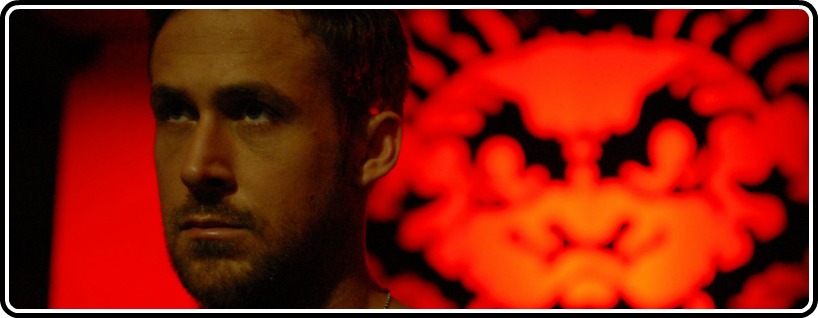Very few partnerships have been lit by as powerful a spark as the team of director Nicolas Winding Refn and star Ryan Gosling. With their first team up, the entrancing (if overrated) “driver without a name” picture Drive turning both Refn into a household name and Gosling into something far beyond even his A-list status (I’d argue few actors have been as high on that list while also hold cult-like status among fans), the pair are back with what may be some of the most interesting work in either of their careers.
Entitled Only God Forgives, Refn returns to something less like his recent Drive and far more similar to what may be his best picture, Valhalla Rising, this time telling the story of a man named Julian. A smuggler with an appreciation for Thai boxing, he’s found his footing in Bangkok, taking hold of some of that criminal underground. With coke and heroin imports funding him, it is his icy cold story that we follow.
His life takes a drastic turn (or, at least as drastic as a film this brazenly monotone will allow) when his brother is murdered by the father of a young girl he raped and killed. Toss in a mother who appears to be seen as something more than just the bearer of his life in Julian’s eyes, and you have a story of violence, revenge and everything you would expect from a director who has taken to spinning a neon-noir story as seen through the lens of a man who has seen the films of Stanley Kubrick one too many times.
But with that, one must say that, a plot description doesn’t do the film any real justice. In the credits, Refn proclaims that he dedicates this picture to Alejandro Jodorowsky. And oddly enough, that’s fitting, because while justifiably polarizing audiences left and right, this film shares one great thing with the works of that auteur. It’s cinema, distilled. Instead of plastering a narrative onto celluloid, the cinema in a way becomes the film’s force of narrative. In other words, this is something utterly bewildering, beautiful and breathtaking.
An inherently existential picture, Refn’s now oddly maligned picture is polarizing, arguably superficial and base, but without a doubt thrilling. Ryan Gosling is as stone faced as one could hope from this film’s lead, a man who would fit right at home in either a Leone Western or a film like Kubrick’s 2001, and while his narrative is a simplistic tale of revenge with some Freudian mother issues tossed in, it fits in perfectly with Refn’s core intent.
Everything about this film screams deconstructionism. From the film’s theme, to the nature of its photography and framing, the film is an admittedly base piece of work, but intentionally so. Refn, much like in Valhalla Rising, takes all of his core ideas, sets them to their absolute base level, and rebuilds the film in that image. Ostensibly a 20 minute long story stretched out to 90 minutes, what follows is a tale of revenge that is unlike anything that we’ve ever seen before.
Similar in tone to Drive, the film feels like that picture’s angrier, more aggressive and more pensive younger brother. Refn frames this film almost entirely symmetrically, giving the film (as mentioned above) a very Kubrickian, dystopic aesthetic, turning the hyper-stylized world of film noir on its head, injecting some nitrous-oxide directly into the film’s color palette. With reds and blues that would make Gaspar Noe blush, the film even uses fades reminiscent of a picture like The Shining, the film that this writer sees the closest resemblance to. Kubrick’s film is, in many ways, trying to do similar things with deconstructionism, simply subbing in horror tropes, images and ideas for his picture, instead of noir tropes for Refn’s. The photography is absolutely breathtaking here, with Larry Smith churning in some of the best work of his career, which includes work on films like Kubrick’s Eyes Wide Shut, and the inspiration is felt beyond a shadow of a doubt. He also has worked on films for Refn like his great picture Bronson, yet this feels like his most distilled, primal piece of work to date. Think the heightened color palettes of Bronson, but on a 90 minute codeine trip.
That said, this picture isn’t for everyone. As mentioned previously, the narrative, while existent unlike how many people would have you think, is admittedly extremely thin, but that’s kind of the glory of this film. A picture as driven by id as we’ve seen this year, a tone piece is just the type of counter programming that this summer so richly deserves. Performances here are also oddly enthralling, with Kristin Scott Thomas doing some of the best, most ferocious work of her entire career, and Vithaya Pansringarm playing what can best be described as the “god” that the film so rightly describes in its utterly perfect title. Both fit perfectly in this black, white and blood-red world that Refn painted (he both wrote and directed the film), and while it may not amount to much for those not willing to go for this ride, these performances, and Refn’s aesthetic, should help the rest.
Overall, this will likely become one of 2013’s most underrated gems, and for fans, this will be something you never truly forget. Scorching aesthetically and utterly frigid narratively, this meditation on violence finds a narrative becoming far richer for those who stick with it through the final act (there are a few really intriguing narrative threads involving Julian’s father that play into the picture’s Oedipal conceits), and for visually-centric viewers, this will be the closest thing to “porn” you’re likely to see all year. Possibly set to become this year’s Beyond The Black Rainbow, Refn’s film features a score from Cliff Martinez that could become a contender for best of the year, and a style that is as brooding and angry as anything the director has ever done. Polarizing for good reason, this film will definitely be one you won’t want to miss.






![Bergman Island (The Criterion Collection) [Blu-ray]](https://criterioncast.com/wp-content/uploads/2022/11/bergman-island-the-criterion-collection-blu-ray-400x496.jpg)
![This Is Not a Burial, It’s a Resurrection (The Criterion Collection) [Blu-ray]](https://criterioncast.com/wp-content/uploads/2022/11/this-is-not-a-burial-its-a-resurrection-the-criterion-collection-blu-ray-400x496.jpg)
![Lars von Trier's Europe Trilogy (The Criterion Collection) [The Element of Crime/Epidemic/Europa] [Blu-ray]](https://criterioncast.com/wp-content/uploads/2022/11/lars-von-triers-europe-trilogy-the-criterion-collection-the-element-of-400x496.jpg)
![Imitation of Life (The Criterion Collection) [Blu-ray]](https://criterioncast.com/wp-content/uploads/2022/11/imitation-of-life-the-criterion-collection-blu-ray-400x496.jpg)
![The Adventures of Baron Munchausen (The Criterion Collection) [4K UHD]](https://criterioncast.com/wp-content/uploads/2022/11/the-adventures-of-baron-munchausen-the-criterion-collection-4k-uhd-400x496.jpg)
![Cooley High [Criterion Collection] [Blu-ray] [1975]](https://criterioncast.com/wp-content/uploads/2022/11/cooley-high-criterion-collection-blu-ray-1975-400x496.jpg)